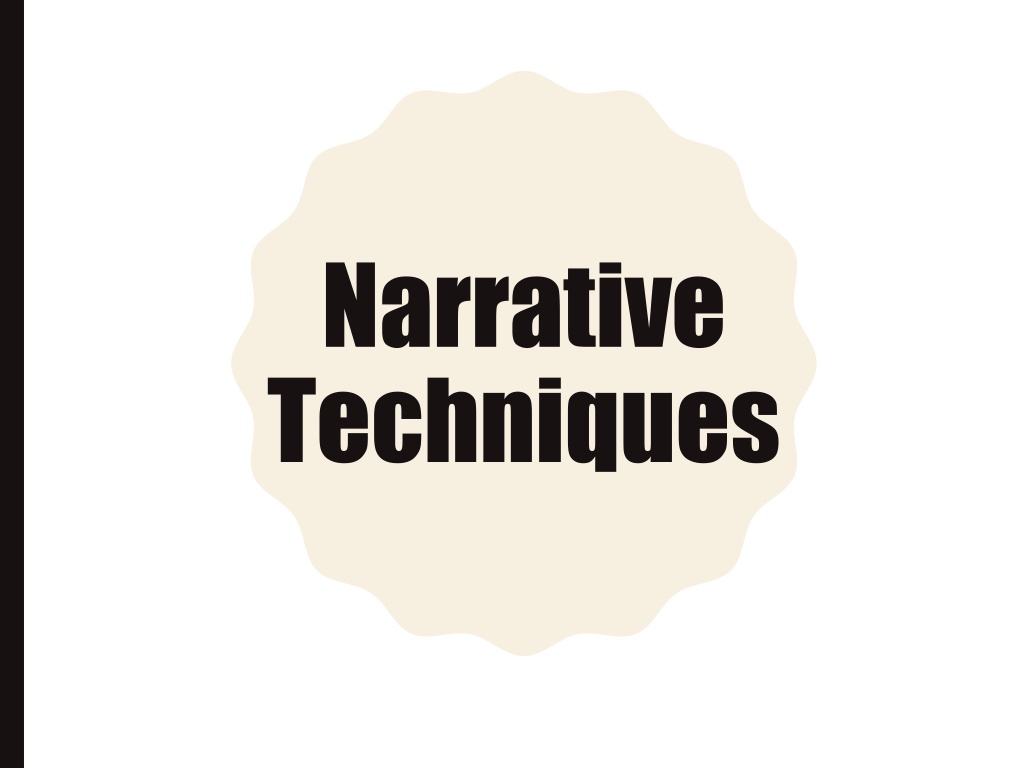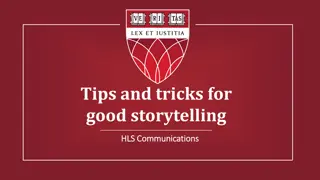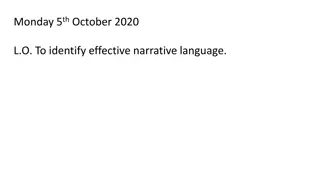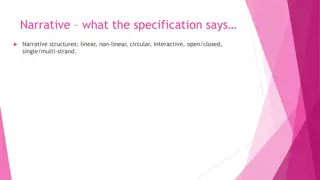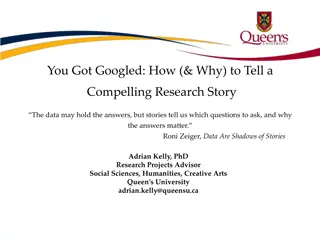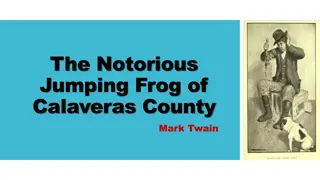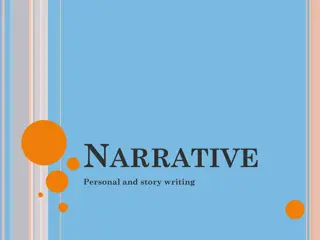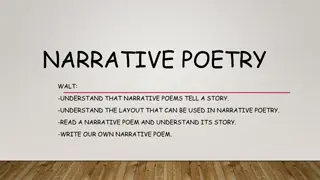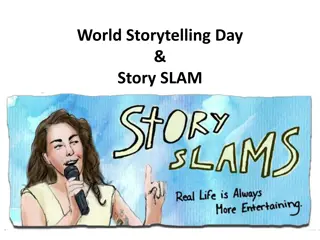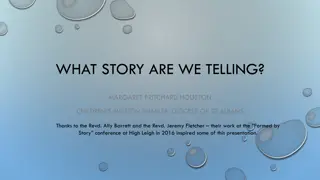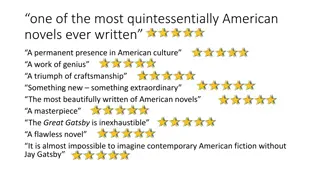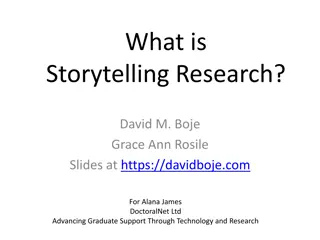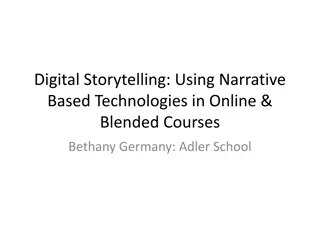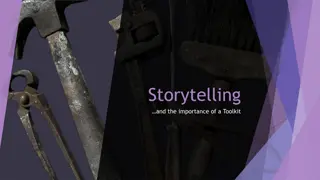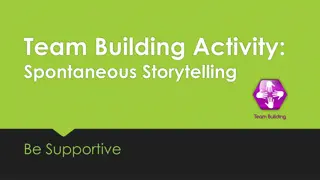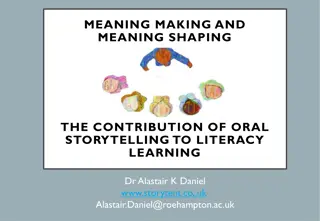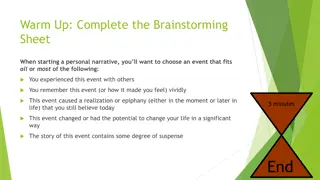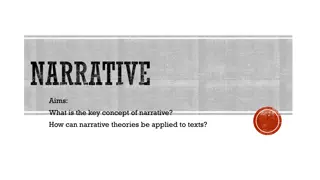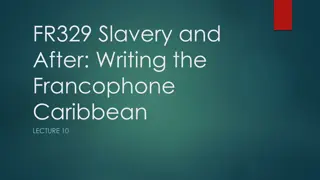Exploring Narrative Techniques in Storytelling
Delve into the world of narrative techniques used in storytelling, including first person narration, flashbacks, framed narratives, and foreshadowing. Understand how these techniques shape the way stories are told and immerse readers in captivating storytelling experiences.
Download Presentation

Please find below an Image/Link to download the presentation.
The content on the website is provided AS IS for your information and personal use only. It may not be sold, licensed, or shared on other websites without obtaining consent from the author. Download presentation by click this link. If you encounter any issues during the download, it is possible that the publisher has removed the file from their server.
E N D
Presentation Transcript
Narrative Techniques
Narrative: A specific story about you or a characters life Different techniques to tell the narrative
First person First Person: point of view where the story is narrated by one character at a time. This character may be speaking about him or herself, or sharing events that he or she is experiencing. Only see the point of view of one character Sometimes will go back and forth between multiple characters
First Person Example Uses I, me, we, us, you etc.
Flashback Flashback: a single vivid memory of an event in the past (MAIN story takes place in the present time). Taken place before the present time the narration is following Examples: past narratives by characters, depictions and references of dreams and memories Flashback is used to create a background to the present situation, place or person.
Flashback Example Flashback: a single vivid memory of an event in the past https://www.google.com/search?safe=strict&rlz=1C1GCEU_enUS820US820&biw=988&bih=588&tbm=vid&ei=lApcXcDGJqvD 0PEPzZKDYA&q=hunger+games+pigs+bread&oq=hunger+games+pigs+bread&gs_l=psy- ab.3..33i160k1l4.21932.25355.0.25465.23.18.0.4.4.0.196.1449.9j5.14.0....0...1c.1.64.psy- ab..5.18.1460...0j0i131k1j0i5i30k1j0i8i30k1j33i299k1.0.U4hqRjNNdhI
Framed Narrative Framed Narrative: an introduction that sets the stage for a more emphasized second story The people/places will interrupt the emphasized story throughout The second story is what we remember the most Usually along the lines of Let me tell you a story about
Framed Narrative Example https://www.youtube.com/watch?v=KXJYWb4y1Hc
Foreshadowing Foreshadowing: an advance hint of what is to come later in the story. Appears at the beginning of a story or a chapter Helps the reader develop expectations about the coming events in a story. Dialogue, event or even title can hint at what may occur in future.
Foreshadowing Example First Page: When my brother Jem was almost 13 he broke his arm, badly. Even though it healed, we always talked about what really caused the accident (Lee 13). Last Scene:
In medias res In medias res: a narrative that begins in the middle of the story-usually at some crucial point in the action. After the big event, the story will explain how the events started then moves forward. Latin for in the midst of things
In medias res Example https://www.google.com/search?q=emperor%27s+new+groove+opening&safe=strict&rlz=1C1GCEU_enUS820US820&s ource=lnms&tbm=vid&sa=X&ved=0ahUKEwijue_p4ZHkAhUGIjQIHbvZCxAQ_AUIESgB&biw=988&bih=588
Breaking the fourth wall Breaking the fourth wall: the author or the main character talks directly to the reader. The other characters don t know/acknowledge it
Breaking the fourth wall example
Plot Twist Plot twist: radical change in the expected direction or outcome of the plot
Plot Twist Example No example provided-it would ruin the ending of any story! The villain is the hero The witness is the killer
Sensory Language Reminders
DESCRIPTIVE/SENSORY Imagery- must reference multiple senses Simile-comparison of 2 unlike things using like/as Metaphor- comparison of 2 unlike things Repetition- word or phrase used 3+ times in close proximity IE: One phrase can t be at the beginning and at the end and then call it repetition.
DESCRIPTIVE/SENSORY Allusion- reference to literature/history My big brother was my Yoda. My brother and I watched Star Wars Onomatopoeia- word that sounds like a sound Alliteration- the occurrence of the same letter or sound at the beginning of adjacent or closely connected words
